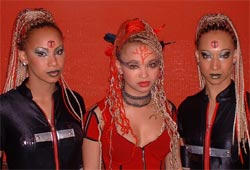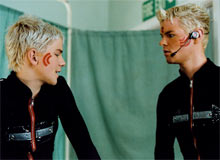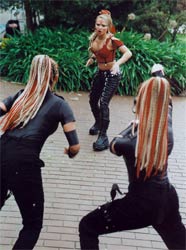 Do you have brothers or sisters? Sibling relationships are often close but very complex. Emotions such as love, respect and pride sometimes clash with less favourable traits such as jealousy and animosity. Sound familiar??
Do you have brothers or sisters? Sibling relationships are often close but very complex. Emotions such as love, respect and pride sometimes clash with less favourable traits such as jealousy and animosity. Sound familiar??
Like all sibling relationships, the ones in the Tribe display the same complexities that many of us experience at home. Later in the article we will look at the relationships between first Jay and Ved; and then between Java, Siva and Ebony. It will be interesting to see which aspects of the relationship you find consistent with your ‘sibling experience.’
Siblings – you’ve gotta love them
Go on – admit it – it is great to have brothers and sisters. I can hear the mock protests from here! But seriously, often your siblings can be your best friends. Some siblings grow up doing almost everything together – playing sport and games, hanging and going out.
Luckily siblings are markedly different in their personalities and interests, as this brings variety to family life – does it not? Some people think that siblings develop opposing personality types to compensate for each other. From your experience do you agree with this?
If you do have siblings, it’s more than likely that you know them pretty well and therefore it is important that you accept them as they are and to learn to live with both their strengths and weaknesses.
 Experiences of sibling roles – are they the same as yours?
Experiences of sibling roles – are they the same as yours?
In a traditional family, there are often two to three children included in the equation. In terms of the roles of the siblings, there are some noticeable trends that seem to occur.
It is important to note that the following are only my general observations and that they could be very different from what occurs in your family. Then again some might be similar so read on!
Oldest child
The oldest child in the family often has to ‘pave their own way.’ The financial position of the family is sometimes more difficult when they first arrive on the scene. They often develop quite a dominant personality compared to other siblings. Because they are the first in the family they often make a big impact at school. Their role as the oldest and therefore also the ‘child minder’ makes them responsible and often hard working.
Second child
The second child can often be a bit rebellious, as they want to avoid living in the shadow of the oldest child. It really annoys them at school if they are compared or, even worse, mistaken for their older sister or brother. They will quite often compete with the older sibling for a while and then develop interests and strengths in their own right.
Third child
The third child is sometimes looked upon as having it a bit easy by the older siblings, which may or may not be true. The financial position of the family is often a bit stronger by the time they are growing up. The others can think that the child is ‘spoilt’ and that they are the mollycoddled babies of the family. As you can see the third child probably has to put up with a fair amount of condescension. Partly because of this the child is forced into asserting themselves and become quite good at it.
There are lots of other factors that have an impact on the particular roles taken by each sibling.
These could include:
- Gender of siblings
- Particular personalities of parents
- Parents perhaps expecting children to play certain roles (the responsible older child could be an example of this)
- The child’s peer group and surroundings
- Are the parents together?
- Are there step parents involved?
 Siblings in The Tribe
Siblings in The Tribe
The younger siblings in the Tribe are certainly more rebellious than the older ones. Take the relationship between Jay and Ved for instance. Jay is older, more responsible and keen to see right prevail. Ved is more roguish and disobedient; but is nevertheless quite sensitive as his relationship with Cloe shows.
There is no doubt that Ved is very jealous of Jay. He sees Jay as a bit of a “goody two shoes” but is definitely less secure in himself than his older brother. Ved’s blatant quest for power may be a result of:
1. Ved having always been referred to and regarded as ‘Jay’s little brother’
2. Ved continuing to feel inferior to Jay due to Jay’s superiority in the Techno hierarchy
Java, and to a lesser extent Siva, are extremely jealous of little sister Ebony. It is the traditional older sibling view of the third child- thinking the third is ‘spoilt’ and ‘has it all.’ Ebony has probably always seen a need to assert herself in the eyes of her sisters. The reason for her need to have power may be similar to Ved’s – a way of covering up a feeling of inferiority next to her siblings. Ebony’s almost bullying personality could possibly be down to Java and Siva’s put-downs when she was younger.
 Being an only child
Being an only child
If you are an only child, you are probably feeling quite relieved that none of this sibling rivalry malarkey has anything to do with you. You don’t have to worry about any jealousy or antagonism at all. I suppose the downside to this is that you don’t have a sibling as a companion but, as you know, there are plenty of friends out there who you can turn to for similar fun and games.
If you’ve got a sibling then you’ve got them for life
Some people are under the impression that you have a brother and sister until you get to a certain age and then it all stops as adulthood sets in. Well thankfully, this is certainly not the case and siblings often continue their close knit relationships well into old age.
It makes sense, therefore, to really foster your relationship with your siblings when you’re young. Any problems that you have (and no doubt there will be some) should be ironed out then and there. You certainly don’t want problems of sibling rivalry affecting you as you get older. Life is too short and there’s too much fun to be had!

